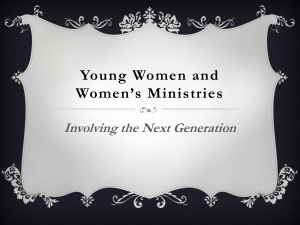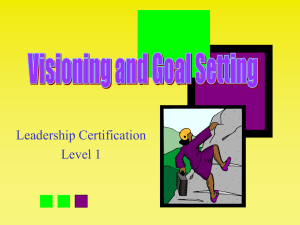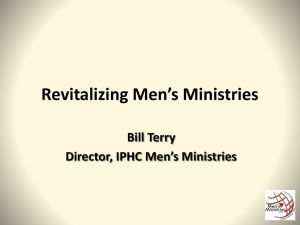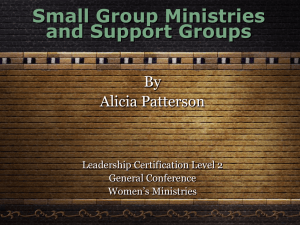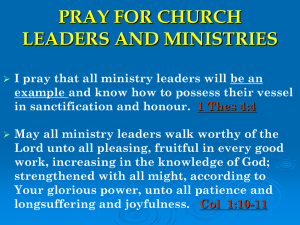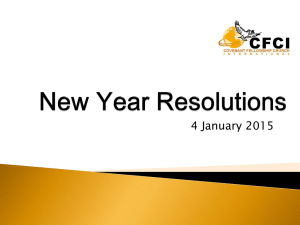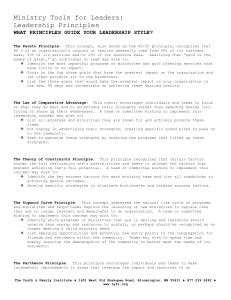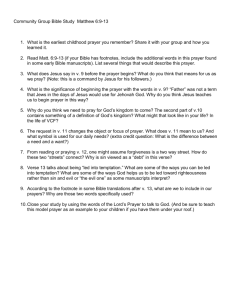Handbook Section V- Programs & Projects
advertisement
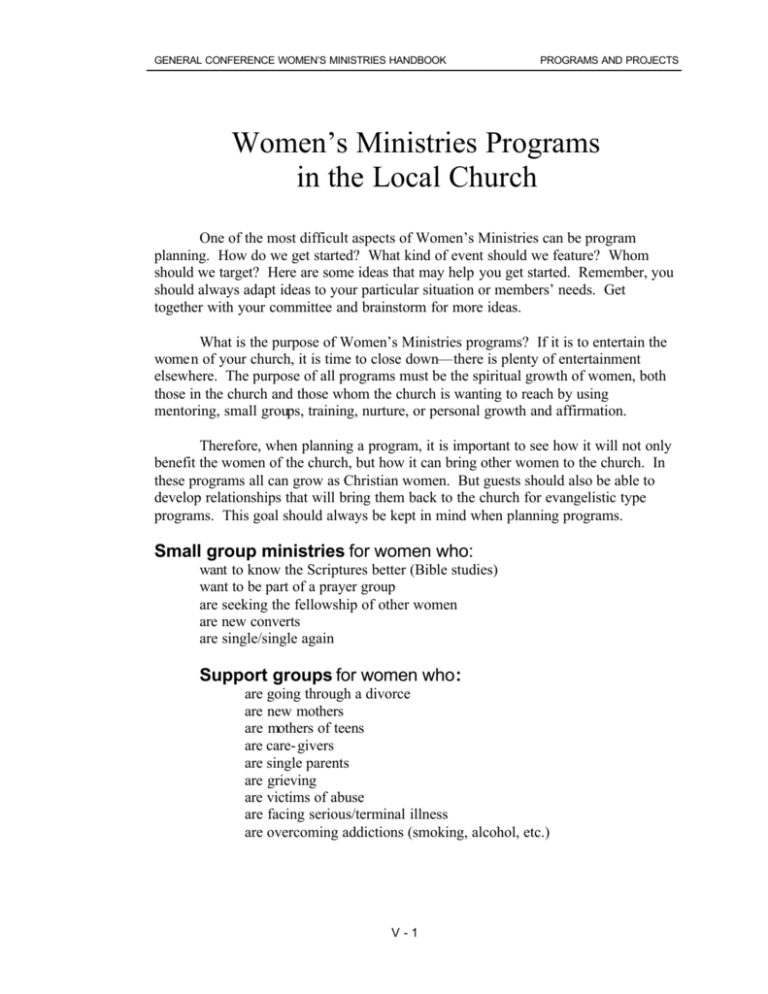
GENERAL CONFERENCE WOMEN’S MINISTRIES HANDBOOK PROGRAMS AND PROJECTS Women’s Ministries Programs in the Local Church One of the most difficult aspects of Women’s Ministries can be program planning. How do we get started? What kind of event should we feature? Whom should we target? Here are some ideas that may help you get started. Remember, you should always adapt ideas to your particular situation or members’ needs. Get together with your committee and brainstorm for more ideas. What is the purpose of Women’s Ministries programs? If it is to entertain the women of your church, it is time to close down—there is plenty of entertainment elsewhere. The purpose of all programs must be the spiritual growth of women, both those in the church and those whom the church is wanting to reach by using mentoring, small groups, training, nurture, or personal growth and affirmation. Therefore, when planning a program, it is important to see how it will not only benefit the women of the church, but how it can bring other women to the church. In these programs all can grow as Christian women. But guests should also be able to develop relationships that will bring them back to the church for evangelistic type programs. This goal should always be kept in mind when planning programs. Small group ministries for women who: want to know the Scriptures better (Bible studies) want to be part of a prayer group are seeking the fellowship of other women are new converts are single/single again Support groups for women who: are going through a divorce are new mothers are mothers of teens are care- givers are single parents are grieving are victims of abuse are facing serious/terminal illness are overcoming addictions (smoking, alcohol, etc.) V-1 GENERAL CONFERENCE WOMEN’S MINISTRIES HANDBOOK PROGRAMS AND PROJECTS Fellowship Opportunities: aerobics night out (concert, eating out, plays, etc.) neighborhood study groups social opportunities that include spouses for women married to non-SDAs Mom’s in Touch The Widow’s Mite Women’s Health Issues: stop smoking classes for women (Breathe Free for Women) weight-loss clinic nutrition classes cooking school exercise group walking partners Prayer Activities: breakfasts baskets gardens (at home or church) groups partners chains The purpose of Women’s Ministries is to connect women with gifts with women with needs. V-2 GENERAL CONFERENCE WOMEN’S MINISTRIES HANDBOOK PROGRAMS AND PROJECTS Seminars on various topics including: abusive relationships addictions aging gracefully AIDS education basic first-aid Bible marking communication in relationships coping with grief coping with an alcoholic spouse/child creative hospitality dealing with loneliness depression dressing like a daughter of the “King” eating disorders elder care forgiveness giving Bible studies guiding your child’s sexual values homemaking - the lost art how to prepare and present devotionals how to be a Christian on the job intercessory prayer legal matter chatter marriage to a non-believing spouse mentoring money management nutrition praying in public pregnancy and childbirth public speaking Scripture memorization self-esteem serving on committees single and happy single parenting stress management suicide teen issues the art of story telling time management and home organization weight loss women’s ministry women’s health issues: hair and skin care sexually transmitted diseases cancer and self breast examination exercise menopause writing for a newsletter your “professional image” Ideas are a dime a dozen. People who put them into action are priceless. V-3 GENERAL CONFERENCE WOMEN’S MINISTRIES HANDBOOK PROGRAMS AND PROJECTS Women’s Ministries Outreach Activities in the Community While all Women’s Ministries activities should be carried out with an evangelistic intent, some programs may be planned partly to attract community women first. This could act as the preparatory step towards inviting people to evangelistic meetings later on. Neighborhood Christ-centered Bible study groups Inter-denominational prayer breakfasts International Women’s Day of Prayer Vegetarian cooking classes Breathe Free for Women Divorce recovery Grief recovery Sponsor well-known speakers Scripture-reading day Meals for Kids Welcome Baby program Literacy programs Health education for new moms Financial management Stress reduction Prison Ministry Homes for AIDS babies 1-800 Crisis Hotline Homes for battered women V-4 GENERAL CONFERENCE WOMEN’S MINISTRIES HANDBOOK PROGRAMS AND PROJECTS Heart-to-Heart Heart-to-Heart is a structure to promote friendship between older and younger women. Titus 2:3-5 places the responsibility for teaching and disciplining younger women upon mature, godly women. The experience, empathy, maturity, and spirituality of these women create an enormously powerful reservoir of untapped, God-given strength from which the church can benefit. Women need it; scripture commands it. The Heart-to-Heart program taps this reservoir. The following guidelines are suggested: 1. Make a one year commitment to the relationship. 2. Contact each other once a week and meet at least once a month. 3. Pray for each other. 4. Do things together—whether it be Bible study, shopping, learning a new skill, or just going to lunch. Each set of partners is free to do what they want as long as they work on the relationship. In Dallas, Texas where this has been utilized successfully for some time, they say, “This ministry works. Some older women enjoy it so much that they are meeting with several young women. And younger women love these friendships! They feel loved and have someone to call on for support and wisdom.” Women need socialization with other women. The isolation and loneliness women are feeling is not so much that communication between men and women has broken down, but that the communication between women and women has broken down. Women need other women. This is a ministry of encouragement, promoting friendship for support, counsel, and guidance. Because lives are changed through Christian love and support, families benefit, neighborhoods profit, and the entire church is blessed. HOW TO START The coordinator of Heart-to-Heart is a Women's Ministries Committee board member; her primary function is to oversee the operation of the Heart-to-Heart ministry of senior and junior partners. V-5 GENERAL CONFERENCE WOMEN’S MINISTRIES HANDBOOK PROGRAMS AND PROJECTS ADMINISTRATION She shall select an assistant to help with administrative responsibilities: a. To help in matching senior/junior partners. b. To help make rematches when necessary. c. To help coordinate and publicize social events. The coordinator and assistant use their knowledge of the women as well as the profile sheets to make matches. If possible, try to match women who are geographically close, and have at least two interests in common. There must be an appropriate age span between the partners. Generally, women under 35 are juniors; women 35-45 are either, and women 45 and over are seniors. Some women in their late twenties and thirties can become a senior to a younger woman, but also become a junior to an older woman. Most of all, pray that God's will be done in the matching process. When a match is made, the senior initiates the first call to her junior, but from then on calling should be equal between the two. The coordinator and/or her assistant should call the partic ipating members in Heart-to-Heart monthly to find out how the matches are progressing. The coordinator should also keep a file of profile sheets, brochures, entertainment records, suggestions, etc. She shall select the senior and junior members of the Heart-to-Heart Steering Committee: a. To call the matched partners for follow-up and accountability. b. To assist in preparing social events and announcements. The Steering Committee consists of trustworthy junior and senior women who serve two year terms. They are each given a list of matches which they are responsible to pray for and to call monthly. PUBLICITY Have a one month sign- up period. C Make announcements and provide information and sign- up tables throughout the church. C Place announcements in the church bulletins and newsletters. C Plan a Heart-to-Heart tea or luncheon to share experiences to encourage others to join. V-6 GENERAL CONFERENCE WOMEN’S MINISTRIES HANDBOOK PROGRAMS AND PROJECTS I Married a Possibility In our church today there are many lonely women. Some feel cut off, disconnected, and lonely because they are married to non-believing spouses. I MARRIED A POSSIBILITY (I.M.A.P.) provides an environment where small groups of women who share this vital commonality of being married to a "beloved unbeliever," can come together and find support. The special focus of the small groups is to provide an atmosphere of acceptance, understanding, a sense of belonging, spiritual growth, and friendship. The formation of prayer prayer chain utilized for for each other’s spouses numbers for phone calls partners is encouraged, and a specific needs. Members pray and exchange phone during the week. Using the structure of sharing common joys, prayer, new strength comes to relational Bible study, struggles, and answers to deal with daily difficulties. Women no longer need to but this small group ministry friendships and support so that rather than a lonely experience. other church activities together enjoyable for an I.M.A.P. feel "spiritually single" alone, can provide them with coming to church is a joyful Members sit together, attend and this makes church more The group plans social activities in each others homes, at a park, or a restaurant to include spouses. This social contact often begins to neutralize the spouses resistance to the church and can lead to his joining the church family some day. È V-7 GENERAL CONFERENCE WOMEN’S MINISTRIES HANDBOOK PROGRAMS AND PROJECTS Divorce Recovery The purpose of divorce recovery groups is to provide information, support and friends who will listen without criticism. With a rising divorce rate, there is a need for healing—in a non-judgmental, supportive environment. Divorce tears the survivors apart and they need the support of the church. They have spiritual, financial, social, and emotional needs. There never seems to be an end with divorce...the emotional trauma goes on and on and often there are problems with other relationships. With death there is a finality, but in divorce there are continual emotional traumas. This suggested format is one that provides an opportunity to grow, share, and heal within an informative and supportive environment. C C C Form a group of 10-11 persons maximum desiring support through/after divorce. The first hour is informative with a speaker, a panel or interviews and testimonies. The second hour is spent with an experienced facilitator (leader). This is not therapy, but support. The topics for discussions that have been the most helpful in these groups are: 1. Accepting the reality of divorce—discussing the grief process—the shock, denial, anger, and negotiating. Time alone does not heal. Support is needed through these steps and friends can be the greatest help. 2. Coping with loss and coping mechanisms available—the loss of self-esteem, security, a place in society and an identity can be discussed. 3. The unfinished business—denial, anger, fear, guilt, and being real and honest with these emotions. Journaling, where members of the group write out their feelings, is presented as a tool in dealing with unfinished business. 4. A new sense of family, helping the children cope. 5. Forgiveness—the importance of being honest in the relationship. Sometimes they are given the opportunity to write a letter to the former spouse which is not necessarily mailed, but aids in the healing process. 6. Loneliness, dating, and intimacy in new relationships. È V-8 GENERAL CONFERENCE WOMEN’S MINISTRIES HANDBOOK PROGRAMS AND PROJECTS The Widow’s Might PURPOSE The great British preacher, Alexander Maclaren, said when he was nearing the end of his ministry, "If I had to do it over, I would minister more to broken hearts." The purpose of The Widow's Might is just that—to minister to hearts that are broken. GOALS 1. To reach out with love and understanding to those who have lost loved ones through death, particularly widows. To provide an atmosphere where they can express their grief, and be ministered to. 2. To provide an understanding of the grieving process to those who are experiencing loss. To deal with this from a Biblical perspective. 3. To provide a time when hurting people can meet together for fellowship, sharing of needs, Bible study and prayer. 4. To get these experienced, gifted women active again by involving them in areas of the church where they feel comfortable. Frequency of meetings should be set by the local group, but they probably want to meet about twice a month. The meetings could be day or evening meetings, organized at the discretion of each group, considering ages and transportation. V-9 GENERAL CONFERENCE WOMEN’S MINISTRIES HANDBOOK PROGRAMS AND PROJECTS Small Group Ministry PURPOSE Small group ministries are an ideal way to meet women's needs. They can: C C C C C Create a network of support for women with common needs and interests. Build relationships. Focus on spiritual growth. Train for outreach. Be accomplished without a budget—FREE! Why are small groups an excellent tool for us? The church is God's agent of reconciliation in the world and it should be primarily concerned with bringing people together in healthy, growing relationships with God and others. SMALL GROUP PRIORITY The priority of the small group ministry should be healing and building up people. All our effort should be targeted toward the goal of making us more loving, effective agents of reconciliation. If this takes place in the church, it will draw others to us. SIZE OF THE GROUP 3-12 women constitute a small group 15-40 women is a medium sized group SIX TYPES OF SMALL GROUPS 1. Sharing and Praying Group: This group enjoys sharing experiences and answers to their prayers. They have a need to interact and verbalize. 2. Bible Study Group: This group emphasizes Bible study, marking their Bibles, and completing assignments to be discussed with the group during the next session period. 3. Nurturing Group: This small group is an excellent choice for newly baptized members who want to make friends. It's even good for newcomers who are not members, but want to enjoy Christian fellowship and grow in the Lord. This group enjoys Bible study, fellowship, and getting to know one another. 4. Support Group: This group of women share a common bond. It may be attended by divorced women, widows, persons who have experienced abuse in their lives, singles, women married to non-believing spouses, etc. It's a small group built to focus on similar needs. The members of this group feel free to V - 10 GENERAL CONFERENCE WOMEN’S MINISTRIES HANDBOOK PROGRAMS AND PROJECTS share their needs and feelings because they are all in the "same boat." Persons needing a support group should be grouped with persons with similar needs, such as the widows in one group, divorced women in another, etc. 5. Outreach Group: This group has a special interest in being involved in evangelism. They enjoy Bible Study and all types of outreach endeavors. Let them be creative in what they want to do, but gain the pastor's blessing before you begin any programs that involve either members or non-members. 6. House Church Group: This small group is made up of persons who cannot attend church because there is no church, the distance is too great, or for health reasons. A person in this situation may be able to start a small group that would encourage everyone involved. CAUTION: Don't allow your small group ministry to be reduced to a "Holy Huddle." A Holy Huddle develops when the group focuses only on the pain of the members. There's one thing that will keep this from happening and it can be the key to real personal growth in small group ministry. Determine that every small group will have a project. Reach outside the group to encourage someone else, decide what your group wants to do to focus outside their pain by working together on a mission project. Group Facilitator: Every group needs a facilitator. Someone who is good at keeping the discussion going, by asking the kind of questions that are not intimidating, but rather help relax the group. The facilitator needs to spend time in prayer and preparation before leading out, for effective results. When a person has served as facilitator for a series, perhaps someone else in the group would be willing to facilitate the next time. A good facilitator won't allow one person to monopolize the time or conversation. A good facilitator is able to keep the discussion moving, by asking good questions, or encouraging the members of the group who are quieter to read a question from the study guide or a passage from the Bible. Length of the series: At their first meeting, the group should decide how many weeks they want to meet. Eight to twelve weeks is considered a good number. After this period of time, if there are those who want to leave the group they can do so without feeling that they are abandoning the group. If there are those who want to continue, why not begin a second series? È V - 11 GENERAL CONFERENCE WOMEN’S MINISTRIES HANDBOOK PROGRAMS AND PROJECTS How to Start a Support Group Suppose that some women from your local church Women’s Ministries group come to you, the Women’s Ministries director, asking for help in starting a support group for them. They may be a group of divorced women, overweight women, grieving women, women whose adult children have left the church—there are many possibilities. What do you do? Here are some suggestions: 1. Pray for guidance. You may wish to ask these women to pray with you. 2. Ask other interested persons to help you plan. Perhaps do a survey to find other women interested in this particular topic. 3. Involve the pastor. Be sure she/he knows of your plans and ask for advice or support. The pastor may suggest other interested persons or resources. 4. Choose a leader and others willing to help. A member of the support group will probably make the best leader for the group. 5. If necessary, get permission of the church board. You will need this if you are requesting funds, church meeting rooms, etc. If you request funds, make out a preliminary budget and submit it. 6. Set the time and place of your first meeting. 7. Study the needs of the group. What type of support do they need? Fellowship and support from each other? Experts to give advice? Inspiration and affirmation? You may want to do a survey of perceived needs. Plan a program to begin meeting these needs. 8. Plan the content of your program: C Arrange for a speaker, facilitator, or activity. C Remember to plan for a devotional thought and prayer. C Arrange for someone to open the room and have lights, heat, air conditioning, seating, etc., ready so the room is comfortable. C Arrange for any equipment such as projectors, public address systems, overhead projectors, paper, pencils needed during the meeting. C Arrange for refreshments if desired. C If the meeting will involve parents with children, arrange for childcare. C Arrange for cleaning up after the meeting. 9. Advertise your first meeting. Do this by word of mouth, telephone, church bulletin, posters, and Women’s Ministries newsletter, depending on the type of V - 12 GENERAL CONFERENCE WOMEN’S MINISTRIES HANDBOOK PROGRAMS AND PROJECTS group and the means available. But use every means you can—telling people something just once does not work any more. 10. Evaluate. After the meeting, meet with the leaders and discuss what went well. What needs to be planned before the next meeting? What needs to be changed? Make notes and discuss with your committee or helpers so you don’t forget. For an effective support group: DO DON’T C Provide fellowship occasions C Allow gossiping or complaining C Provide communication opportunities C Promote or allow prejudice C C Be cliquish Maintain a biblical perspective C C Waste time Have an accepting attitude toward all C Get off the planned subject C Label people C Be judgmental C C Speak in a basic language so that all can understand Maintain confidentiality The purpose of a support group is to offer support, help, and understanding by others who have been through the same experience. It should be a place and time for healing, not a pity party. V - 13 GENERAL CONFERENCE WOMEN’S MINISTRIES HANDBOOK PROGRAMS AND PROJECTS Some Christian women feel called to minister to other women behind prison walls. God's Word counsels us not to forget these souls. (Matthew 25:35-39) If there are women in your church who feel called to prison ministry, invite someone experienced in this area, from your denomination or another Christian organization, to speak to the group. Check with the prison chaplains or authorities as to the regulations concerning that institution before planning any activities. With guidance from experienced persons, you can reach out to female inmates in a number of possible ways: 1. Write letters of encouragement to prisoners. Letters are proof that someone cares. Include Bible promises. 2. Offer Bible correspondence courses, Christian books, and cassettes with soothing Christian music. 3. Remember birthdays, holidays, and special occasions in the in- mates life with cards, a phone call, a cake, or a small gift. This will mean a lot to persons cut off from family and friends. 4. If possible, help the prisoner’s family. Call them and ask if there are pressing needs the church family can help to meet. Examples: childcare, groceries, clothing, etc. Invite the family to worship with you. 5. Pray daily for the salvation of specific prisoners and their families. 6. With the permission of the prison authorities, begin a weekly service that includes Bible Study, music, and prayer. V - 14 GENERAL CONFERENCE WOMEN’S MINISTRIES HANDBOOK PROGRAMS AND PROJECTS PRISON VISITATION GUIDELINES Do: Do NOT: C Dress casually, avoid bright colors. C Be afraid. Visiting a prison rarely constitutes danger for you. C Arrive early, sometimes prison officials need extra time to process your visit. C C Visit without first arranging for permission from the authorities, or you may otherwise be turned away. Smile and be yourself. C C Take a camera, tape recorder. Talk about hope for the future, be positive and upbeat. C Tell the inmate about Jesus and His love for her. This has special meaning for someone who is cut off from society. Give the prisoner ANYTHING without first checking with the authorities. C Mention family problems, unless inmate wants to talk about them. C Talk about the inmate's case. C Compliment any part of the prison system. Encourage other Christians to visit. C Forget to pray daily for those you are visiting. Share your positive experiences with others in the church. C Give a prisoner your home address or phone number. C C C C C Tell the inmate when yo u will come again, and keep your appointment. Contribute time and money to prison ministry. Source: Packe, Dale K. A Christian's Guide to Effective Jail and Prison Ministries. Old Tappan, New Jersey, Fleming H. Revell, 1976. V - 15 GENERAL CONFERENCE WOMEN’S MINISTRIES HANDBOOK PROGRAMS AND PROJECTS Life After Work A Working Woman’s Ministry Life After Work focuses on the unreached working women. This ministry has become an important Women's Ministry. Brown Bag Bible Studies Interdenominational Bible studies directed toward meeting the needs of working women which meet over lunch at work. Light Lunches Evangelistic messages presented by a guest speaker shedding light on life in the working world. This is often a four to eight week mini- series. Dinner Talks Similar to Light Lunches. Night Life An evening of in depth Bible study for working women who want to dig deeper into the Bible. Life After Work A large group meeting for working women each Monday night featuring song, seminars relevant to the working world and a message. Sunday Breakfast Series Special presentations on current topics delivered by experts in the field during a Sunday breakfast forum held at a local restaurant or fellowship room, approximately four times a year. V - 16 GENERAL CONFERENCE WOMEN’S MINISTRIES HANDBOOK PROGRAMS AND PROJECTS ΜΟΜΣ ΧΙΡΧΛΕ Ο Φ ΛΟςΕ MOMS—CIRCLE OF LOVE is especially for mothers of preschoolers and young children. Who mothers mothers? Their children can’t and don’t, though they occasionally soothe with a slobbery kiss. Children zero in on their own needs. A husband may come home tired from a day of work unaware of the stress his wife accumulates staying alone all day with little ones. A young mother’s own mother may live far away or may have forgotten the numbing demands of child-rearing days. The church has extolled the role of wives and mothers. It encourages mothers of young children to stay home. Until a few years ago new mothers hardly considered any other option and society affirmed their role in the home. Stay-at-home mothers today often buck public opinion. They not only find little support but may also draw a lot of criticism. She may find she is the only adult in her neighborhood during the day. What’s a mother to do? To whom shall she turn? Can the church assist those who feel overwhelmed, isolated and stressed? Young moms have so much to share with each other, a wealth of hands-on experience, broad shoulders for supporting each other, and because our hands stroke and pat the little heartbeats of the future, our eyes focus with a ric h maternal vision. Let’s use that vision to uplift, encourage and promote the extraordinary challenge and art of mothering. Our mother hearts yield up a tender touch. There is a famine for this priceless treasure. Let’s give it generously—to our children, to our families, to each other. Who mothers mothers? We do. In this program, Women’s Ministries focuses primarily on the woman herself, supporting her, encouraging her in her chosen role. INFORMATION QUESTIONNAIRE Send out a questionnaire to the women in your church, informing them of your hope to form small Moms Circle of Love Groups (of no more than 8-10 mothers per group). Ask them: V - 17 GENERAL CONFERENCE WOMEN’S MINISTRIES HANDBOOK a) b) c) d) e) f) PROGRAMS AND PROJECTS if they would be interested in attending. how often would they attend? what is the best time, or day, in the week? would they like to lead a MOMS groups? what role would they like a MOMS small group to fill for them as a woman? what areas in their lives are the most neglected? POSSIBLE TOPICS TO EXPLORE Discipline Dysfunction PMS Crafts Single Parenting Fitness Daycare Burnout Grandparents Anger Devotions Postpartum Depression Infertility Spiritual Gifts Mom’s Night Out Spiritual Growth Time Management Stress Management Do you know a good speaker who can speak knowingly on these subjects? GOALS We intend that the small Moms Circle of Love groups will be a place where you can develop special friendships and find others who understand your ups and downs as a woman who is also a mother. Confidentiality is an important goal, and we also would hope that you may return to your roles refreshed and aware that you are not alone. Sources: Spruill, Karen. Starting a Mothers Support Group, 1988. V - 18 GENERAL CONFERENCE WOMEN’S MINISTRIES HANDBOOK PROGRAMS AND PROJECTS MOMS IN TOUCH What is MOMS IN TOUCH? C It is two or more moms who meet for one hour each week to pray for their children, their school, their teachers and administrators. C It is for mothers, grandmothers, or anyone who is willing to pray for a specific child in school. C It is praying for students, preschool through college. C It is for Moms who believe that prayer makes a difference. With the influence of television, music, drugs and all other negative influences in our schools today, we are finding that a group of praying mothers is tremendously supportive and can make a great difference. These mothers have vision, direction, and faith. Their praying is very confidential. They spend their time praying—not talking, and they find promises to fit the needs. Some mothers take cookies to the school, or meet with the faculties; it has been a very positive influence for our schools. The purpose of Moms in Touch is to intercede for our children through prayer and to pray that our schools may be guided by Biblical values and high moral standards. Lamentations 2:19 is the guiding scripture for Moms in Touch. It says “pour out your heart like water before the face of the Lord. Lift up your hands toward him for the life of your children.” È V - 19 GENERAL CONFERENCE WOMEN’S MINISTRIES HANDBOOK PROGRAMS AND PROJECTS Bible Studies Here is a list of Bible studies which you might be able to use in your ministry. All have either been written by women or used by them successfully in one to one evangelism. The authors have given permission for translation of these studies and for copying as needed for giving studies. They may NOT be sold for profit. Bible Studies C C C C C C C Meet My Friend Jesus (16 lessons) by Ione Richardson The Teachings of Jesus (27 lessons) by Ione Richardson Health and Life Lessons (24 lessons) by Gordon Martinborough Family Life Bible Studies, Series One (6 lessons) by Gordon Martinborough Family Life Bible Studies, Series Two (8 lessons) by Gordon Martinborough Training Light Bearers (30 lessons) Personal Ministries Department Specially for Women (14 lessons) by Ardis Stenbakken and Carole FerchJohnson. Most of these studies will be in the Evangelism Manual, which is available through your conference, union, or division director. Please check with them for any new programs or sets. You may also purchase the above listed studies through the General Conference Department of Women’s Ministries. Other Sets to Use New Discovery Lessons. The women of South America use the New Discovery set of Bible studies in their B=B (Bible = Baptisms) program. These are available in Portuguese and Spanish. Write to Evelyn Nagel, South American Division Women’s Ministries director. Thousands of people have been baptized as the result of women using these lessons. The Marked Word. These Bible study guides by Gertrude Battle describe how to mark your Bible for ease in giving studies on 37 different topics. Complete Bible studies and Bible marking instructions for each one is given. It is a 147 page loose-leaf set of studies punched for a three-ring notebook. Available through North American Division Distribution Center, 5040 Prescott Avenue, Lincoln, NE 68506; Tel: 402-486-2519. È V - 20 GENERAL CONFERENCE WOMEN’S MINISTRIES HANDBOOK PROGRAMS AND PROJECTS Organizing a PALS Program (Prayer and Love Saves) I. Purpose of the PALS Program The purpose of the PALS program is to encourage parents who have adult children who have wandered from God and the church. It is to provide an arena in which such parents can overcome their guilt, find support in one another in mutual concern, develop skills to build relationships with adult children and their families and intercede for their adult children in prayer. II. Scope of the PALS Program The PALS program has eleven lessons, which are divided into three basic focus areas: accepting, loving, and praying, Part I focuses on the reality of the situation and encourages parents to accept the things they cannot change, to work with the things they can, and to know the difference when it comes to their relationships with their adult children. It's about releasing parents from blame, letting go to face their own feelings, and taking a look at the differences between themselves and their children. Part II is a practical section of what parents can do to build better relationships with their adult children and their grandchildren. It is looking to the future and choosing the steps by which they can communicate love. Part III is devoted to interceding for adult children who are prodigals. It offers prayer support for parents who are in pain over the choices their adult children have made. The final chapter makes suggestions for a better future. III. Program Schedule The following is a suggested outline for using the material in a 70- minute group session. This could be lengthened to 90 minutes and allow more time for sharing, Bible study, group discussion, and prayer. It could be shortened to 55 minutes by supplying the parent showcase and Bible Study as handouts for the parents to do at home. Feel free to adapt this material to the amount of time available. 1. Sharing Exercise 2. Presentation of Topic 3. Parent Showcase V - 21 10 minutes 15 minutes 5 minutes GENERAL CONFERENCE WOMEN’S MINISTRIES HANDBOOK 4. 5. 6. 7. IV. Handout on Topic Small Group Bible Study Group Discussion on Topic Prayer Time PROGRAMS AND PROJECTS 10 minutes 20 minutes 10 minutes Organizational Structure The material has been prepared so that the group leader could easily pick up the material and use it to lead a support-prayer group with a minimum amount of preparation. One person could do all of the basic presentation, or the leader could organize others to give the presentations and parent showcase. 1. Sharing Exercise—This is an icebreaker type of small group activity or whole group interaction that is designed to relax the members or to get them thinking about the topic in an informal way. It is designed to help the members to get to know each other and their children better so that they can feel more empathy and understand where they are coming from. It aids in the bonding of group members. While all are encouraged to share, no one should feel pressured. Parents should be told that they should not share personal information about their adult children or any information that might anger or embarrass the adult children if they should find out it was shared. 2. Presentation of the Topic—This could be used as it is for a prepared talk or it could be duplicated and given out as an assigned reading before the next session. If it is used as an assigned reading, then the presenter would simply give a three to five minute summary at the next session, thus leaving more time for Bible study and topic discussion. This might work with some groups, but would be a problem if all of the members did not do their assignments. The content of the topic is vital for a meaningful discussion time and related Bible stud y activity. 3. Parent Showcase—This is a story of an actual parent or parents who put into practice the concept emphasized for the day. It uses stories of modern Christian parents or ones taken from history of how parents used that principle. This could be done by the leader or he/she may chose to assign this to a different person each week. 4. Handout on the Topic—There is at least a one page handout for each lesson. Except in the case of Lesson 11, these will not be used during the presentation, but will be handed out for the parents to take home and use on their own. Some give helpful ideas for personal devotional time. V - 22 GENERAL CONFERENCE WOMEN’S MINISTRIES HANDBOOK V. PROGRAMS AND PROJECTS 5. Bible Study—These studies focus on a Biblical parent(s) who faced a similar situation or applied the principal under discussion. If the group is small, they could go through this together. Read through the Scriptures given and discuss the questions. If the group is more than eight divide into smaller groups of four to six to do this study. Everyone should have a copy of the Bible study page. 6. Group Discussion—This discussion could be led by the group leader, or divide into smaller groups and give each person a copy of the questions and discuss in their group. Bring all members back together and ask for a summary of answers from the groups. 7. Prayer Time —This is a time for the parents to pray for each other, their own children, and the children of others. It is a time of intercession focused on the parents’ concerns for their children and grandchildren. Other issues should not be brought in. Varied ways of leading the group into prayer time are suggested. Sometimes the prayers will be focused on a specific area of need and other times they may be more general in nature. At times the focus will be on the parents and at other times on their adult children. These ideas given are only suggestions and the leader should feel free to lead in prayer in the most appropriate way for her group. Optional Uses of This Material 1. Weekly Prayer Group—This group could meet at the church or in someone's home at a convenient time. There is enough material for three months. At the end of the three months the group will have the option of continuing. Several books on the references list would be good textbooks to use for a second qua rterly series. The leader should review these books to see which ones are the most suitable for the group. 2. Monthly Prayer Group—A monthly group may want to include more time for socialization, perhaps a supper or breakfast together before the lessons begin. There are eleven lessons, about right for a year if time is allowed for the holidays. 3. Sabbath School Alternative—This material could be used as a support group Sabbath School lesson quarterly for one quarter. The presentation of the material would need to be adapted to the time allotted for lesson study in your church. V - 23 GENERAL CONFERENCE WOMEN’S MINISTRIES HANDBOOK PROGRAMS AND PROJECTS 4. Weekend Retreat—Plan a weekend retreat at a lodge, hotel, or at a conference camp facility. By doing two lessons on Friday evening, three on Sabbath morning, two on Sabbath afternoon, two on Sabbath evening, and two on Sunday morning, all of the lessons could be covered in a weekend. 5. Three Weekend Seminars —The seminars could include one or two sessions on Friday evening and another two or three on Sabbath afternoon, according to the segment of the program used. Do Part I: Accepting Parents on one weekend, Part II: Loving Parents on a second weekend, and Part III: Praying Parents on a third weekend. 6. Camp-meeting Seminar—Use the material for seminars that would be held either once or twice daily, thus covering five or ten of the topics. The leader would need to select the topics to be deleted or combine some topics that are similar in content. 7. Convention Seminar—Material could be adapted for one day or a part of each day at a retiree's convention. Use selected topics. Topics could be used individually as a seminar at a Ladies' Retreat. È V - 24 GENERAL CONFERENCE WOMEN’S MINISTRIES HANDBOOK PROGRAMS AND PROJECTS Planning A Women’s Ministries Retreat Definition of a retreat A drawing back, a regrouping, a “coming about.” Women’s Ministries retreats are for women and are organized and led by the Women’s Ministries director and a retreat committee. The committee is responsible for finding the following leadership as well as others who may be needed for the particular program: program coordinator, timekeeper, accommodation manager, meal planner, hostess for guest speaker, equipment manager, music coordinator, registrations manager, decorating chairperson, prayer group coordinator and treasurer. RETREAT Resort Shelter Escape Sanctuary Withdrawal Retirement Purpose of a retreat Spiritual enrichment, fellowship, support and relaxation. Types of a retreat Local church, groups of churches, conference, or union Leadership Mother-Daughter Teen-age Venue for a retreat Youth camps, resort setting, conference campsite, hotels, recreational facilities, boarding schools during school holidays. Who attends Women only of all ages and from all walks of life. Speakers, musicians, session coordinators, are all women. Theme The committee may choose a theme for the retreat or ask the guest speaker to do so. Decorations and trimmings should be chosen to illustrate the theme. These need to be attractive and have particular appeal to women. A theme song, music, songs, introductions and conclusions should all follow the theme. V - 25 GENERAL CONFERENCE WOMEN’S MINISTRIES HANDBOOK PROGRAMS AND PROJECTS Guest speakers A guest speaker is especially invited to speak on topics of interest specifically to women. She is always given the retreat theme ahead of time and prepares her presentations accordingly. It is helpful if your guest speaker can arrive a day before the beginning of the retreat to meet with the leadership so that everyone can go over the schedule and spend some time getting acquainted and praying for the success of the retreat. Whatever information is sent to your retreat attendees should also be sent to your guest speaker, such as what type of clothes to bring, if there is swimming or hiking, etc., so that she will be prepared to participate also. Time Usually a weekend from Friday night through to Sunday lunch time or an equivalent period convenient to the women who attend. Each session needs to begin and end on time. A time-keeper should be appointed to make sure this happens. Food Food should be prepared and served by someone other than the women attending the retreat if possible so that it truly is a retreat for those attending. A group could be hired to cater or the husbands of some of the women may be willing to do this work. Sometimes one church can do this as a church project. Costs Obviously, a retreat costs money. A budget should be carefully planned and each woman charged a percentage of the total cost. If you are able to get money from your conference or union to help with the cost, be clear on how it will be spent and accounted for. So that women who cannot afford the cost can attend, churches can set up sponsorship type programs, or the money from the conference or union can be used to help those who would really like to attend but who cannot afford it. Each committee should explore other means of keeping the costs down for each woman or helping the needy. Costs should be kept as low as possible while still making a retreat that women will really enjoy attending. Sample Program Program committee will plan the details and print these in a program folder as appropriate, including titles of the guest speaker’s presentations, special music/items, etc. When planning a schedule, allow some time for relaxation and time for the women to be able to talk with each other and get acquainted without having to skip meetings. V - 26 GENERAL CONFERENCE WOMEN’S MINISTRIES HANDBOOK PROGRAMS AND PROJECTS Note: This is only a suggestion. The committee is invited to act creatively and to implement their own ideas and innovations to make the program suit the desires of the committee and the needs of the participants. Sample Program Friday Evening: 4:30 Registration 6:30 Tea/Supper 7:00 Music (with special music/special items) 8:30 Prayer groups are formed 1 (these continue to function for the duration of the retreat) Sabbath Morning: 7:00 Early morning walk (optional) 8:00 Worship 8:30 Breakfast 9:30 Music (with special music/special items) 10:00 Guest Speaker 10:45 Break 11:00 Music 11:15 Guest Speaker 12:00 Testimony and Thanksgiving 2 Afternoon: 12:30 Lunch 3:00 Prayer walk or a promise hunt 4:30 Workshops 3 6:00 Tea/Supper 7:00 Social program, concert, etc. 4 Sunday Morning: 8:00 Worship 8:30 Breakfast 9:30 Music (including special music/special item) 10:00 Guest Speaker 11:00 Workshops 12:15 Closing 12:30 Lunch and leave for home V - 27 GENERAL CONFERENCE WOMEN’S MINISTRIES HANDBOOK PROGRAMS AND PROJECTS A prayer breakfast is a nice feature for Sunday morning; the guest speaker may be the special speaker for this too. Following is a suggested schedule: Example 1 Example 2 8.00a 8:30 9:00 8:00a 8:30 9:00 10:45 12:15 1 Worship Pack and clean rooms Prayer breakfast featuring guest speaker Workshops Closing 11:00 11:45 Worship Pack and clean rooms Prayer breakfast featuring guest speaker Closing Leave for home Prayer Groups Groups can be grouped according to their birth dates, favorite colors, matched motifs, etc. The groups may be directed to when and where to meet for prayer or they may decide for themselves, depending on the culture. Idea: Heart to Heart. Have hearts cut in two, following a unique design for each. At the retreat the women are each given a half of a heart and must find the woman with the half that matches hers. That woman becomes her prayer partner. 2 Testimonies Purpose: allows women to gain strength and spiritual encouragement from listening to the testimonies of other women. Testimonies can include answers to prayer, inspiration from a book or magazine article, divine help in solving a problem, praise and thanksgiving for blessings. Care sho uld be taken that testimony time does not lead to inappropriate disclosures or negative comment or criticism of others. 3 Workshops These should be sessions offering practical help for issues faced by women in any aspect of life. These workshops should be presented in an interactive style rather than a lecture. There should be one workshop planned for about every 25 women in attendance, giving the women a choice of the workshop they will attend. Sunday’s workshops can be a repeat of Sabbath afternoons, giving the women an opportunity to attend one she was unable to attend on Sabbath. There should probably be a minimum of about four workshops from which to choose. V - 28 GENERAL CONFERENCE WOMEN’S MINISTRIES HANDBOOK PROGRAMS AND PROJECTS 4 An alternative Saturday night activity could be an Agape Feast where a Communion is blended with a special candle- light dinner. The menu should be simple (fruit and breads, nuts and dried fruits for example) but the setting should be particularly appealing. Testimonies may follow, citing victories and offering praise and thanksgiving to God. If you plan to have treats or keepsakes for the attendees, (may be placed on their beds before arrival, given at mealtimes or shared during testimony or get acquainted times) these need to be planned and assigned. From year to year different churches or individuals may take on the assignment of making some little item for each woman. LONG RANGE PLANNING SCHEDULE FOR RETREATS Plan Ahead A. One year before… C Prepare committee task sheets C Develop overall budget C Convene executive committee meeting C Develop program session and events C Select and recruit speaker C Visit and reserve proposed retreat facilities C Negotiate meeting rooms at the retreat facilities C Determine attendee fees and expenses C Set up accounting and banking procedures C Check on the insurance policy of your sponsoring organization or the site of your event, to make sure you are covered C Initiate sponsor solicitation C Initiate exhibitor solicitation B. Nine months before… C Complete speaker recruitment C Select committee chair a. Publicity b. Registration c. Hospitality hostesses d. Entertainment e. Prayer, Music, and Platform f. Transportation, and Parking C Develop and distribute first release brochures C Develop pre-registration procedures C Develop pre-registration and accommodation forms C Assign trial projects V - 29 GENERAL CONFERENCE WOMEN’S MINISTRIES HANDBOOK PROGRAMS AND PROJECTS C. Four to six months ahead… C Send out a second news release C Initiate pre-registration C Develop and confirm meeting room requirements C Confirm retreat/convention menus C Acquire local attractions and tourist literature C Continue sponsor solicitation C Continue exhibitor solicitation D. Three months ahead… C Contact the speaker, have her send a photograph for publicity, and if desired, have her prepare questions for small group follow-up discussions C Complete all arrangements for materials and supplies C Confirm attendance to hotel C Prepare final program schedule C More press releases/publicity E. One month ahead… C Mail the formal program to attendees and speaker; includes schedules, fellowship group questions, a map of the retreat facilities, space for notes, etc. C Train your hostessing staff C Train your registration staff C Continue pre-registration C Purchase appreciation gifts for committee chairperson and speaker F. One Week before the event… C Prepare attendee folders C Make name tags G. One day before… C Open registration center for early birds C Have hostesses available C Set up exhibits C Executive committee and speaker moves into hotel H. Each day of your event… C Check the speaker’s schedule C Solve the previous day’s problems—avoid recurrences C Confirm attendance with hotel V - 30 GENERAL CONFERENCE WOMEN’S MINISTRIES HANDBOOK I. The week after… C Prepare thank- you notes/letters C Pay invoices J. Four weeks later… C Pay additional outstanding accounts C Prepare and present financial reports PROGRAMS AND PROJECTS Notwithstanding the Lord stood with me, and strengthened me. 2 Timothy 4:17 Sources: Hamblin, Madlyn Lewis and Cari Hoyt Haus, Successful Women’s Events. Kraft, Vickie, Women Mentoring Women, Moody Press, 1992. V - 31 GENERAL CONFERENCE WOMEN’S MINISTRIES HANDBOOK COORDINATOR C Oversee initial brainstorming C Oversee committees C Finalizes theme C Contact with retreat center C Contact with speaker C Oversee & manage finances PUBLICITY C C C C PROGRAMS AND PROJECTS COMMITTEE JOB DESCRIPTIONS Design and make arrangements for flyers Contact churches with announcements Make and display posters Printed program REGISTRATION C Organize registration times and setup C Organize pre-registration C Design and distribute forms C Collect registration forms and money C Room assignment and special needs (dietary and physical) C Provide packets and name tags HOSPITALITY HOSTESSES C Information and message booth C Breakfast table leaders C Decoration and centerpieces C Maintenance of dietary and physical needs C Provide snacks and drinks ENTERTAINMENT C Coordinate a special welcome for first session C Plan free time activities C Plan Saturday night social special PRAYER, MUSIC, and PLATFORM C Arrange prayer calendar, availability of prayer room, prayer breakfast, short devotionals C Arrange song leaders and pianists C Select special music at each session (solos, duets, instrumentals) C Bring songbooks or overhead transparencies C Arrange audiovisual and platform needs of speaker (microphones, overhead projector, slide projector, lapel mic, paper pad, note paper, pencils, podium, table, photocopying needs, etc.) TRANSPORTATION and PARKING C Transportation needs of speaker and official committee business C Transportation arrangements for planned social activities C Arrange parking details with retreat facility management V - 32 GENERAL CONFERENCE WOMEN’S MINISTRIES HANDBOOK PROGRAMS AND PROJECTS More Ideas “Moms’ Morning Out” Older women can minister to mothers by offering a child care program for a few hours each week. Prayer Breakfasts This type of event provides time for women to share a meal, listen to an inspirational speaker, and share time in prayer. Women’s Evangelistic Meetings Women are proving to be excellent evangelists though often with a different perspective and approach. While some hold traditional type meetings featuring preaching, others are developing home Bible meetings. Local Retreats More Women’s Ministries leaders are planning a day long spiritual renewal retreat for women in their congregations (who are encouraged to invite their non-Adventist friends). After deciding where to hold the event (sometimes in a hotel or a park or the church school, etc.), a keynote speaker is invited. Several workshops are planned (usually covering practical personal and spiritual topics like “How to Give Bible Studies,” “Women’s Health,” or “Time Management.” Special music is lined up, and arrangements are made for meals. Time is included for fellowship and prayer. “Women’s Day” Some churches enjoy devoting a Sabbath to honor women. While the format varies, women usually lead out in Sabbath morning services. After a meal (usually prepared by the men), the afternoon program may feature a concert or workshop or other special event such as a dramatic presentation about the contribution women have made to the church. Reading Parties Ask your guests to bring a short story, a poem, or an excerpt from their favorite book, writer, or story. Sit in a circle and each guest will read what they brought. They may choose to say something about what they are reading, or just let the audience appreciate it as it is. The selection of reading material may or may not be of a spiritual nature. You could choose a theme or let it be seasonal (e.g. Christmas, Easter). As the host, be prepared with at least two short readings (depending on how participative your guest are). Serve refreshments—cookies, hot soup, or salad, and drinks. This is the V - 33 GENERAL CONFERENCE WOMEN’S MINISTRIES HANDBOOK PROGRAMS AND PROJECTS time to build friendships and fellowship with the women present as you learn more about each other’s interest. Ministry to Nursing Homes This outreach group could obtain the names of those from their church who are in nursing homes and then visit, taking small remembrances, such as flowers, cards, or cookies. Other ideas include having your women present special music or lead craft projects and Bible studies. Adopt a Grandparent This ministry might include visits in the home, taking an older person out for meals occasionally, or any other thoughtful gesture to brighten the life of an older person. New Mothers This ministry is to women in our church body or the community who have recently welcomed new babies into their homes, either by birth or by adoption. Our purpose is to show support and encouragement by a personal visit either at the hospital or at home. You could take little gifts like flowers, a baby book, or a calligraphy print of Psalm 127:3. You could give the new mothers a packet of verses that relate to mothering and child rearing to encourage her. Let her know of resources available at the church: baby dedication, tape and book libraries, mother’s support groups, cradle roll Sabbath School, health seminars, etc. Through this ministry we will foster a relationship of trust between the caring church and the new parents. It is an exciting way to demonstrate true Christianity and to develop a strong foundation for friendship and further witnessing. Another program entitled “Welcome Baby” program is available through: Family Matters Box 7000 Cleveland, TN 37320 V - 34
